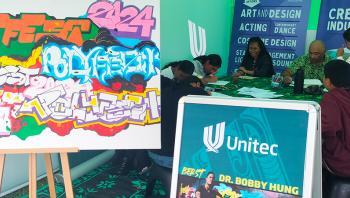Programme overview
The Postgraduate Diploma in Creative Practice enables artists, designers, photographers, animators, educators, performers, directors, producers and other creative thinkers to advance their professional careers within Unitec’s Creative Industries cultural hub.
In the first semester, a combination of taught, negotiated or studio courses allow you to tailor the learning experience to your specialist creative research interests, whether these fall into traditional (graphic design, industrial design, photography, animation, visual arts, performance) or hybrid domains (service design, experience design, design for social innovation, performance or production design, transmedia, interdisciplinary practice).
Your second semester involves conceptualising, proposing and implementing advanced creative research. You will be supervised and mentored by academic staff and/or industry professionals. Creative projects may take place on campus or be integrated into a relevant workplace.
Highlights
- Create a body of new work, improve your job opportunities, and refresh or re-orient your profession.
- Develop critical self-reflection, creative thinking and research skills by taking your practice to an advanced level.
- Work in an evolving multi-disciplinary environment where you will get exposure to a wide range of approaches, practices, and theories.
- Improve your communication and project proposal skills through studio critiques and written components.
- Learn from supervisors that include notable artists, designers, and educators.
- Enhance your creative portfolio with a significant advanced research project.
Screenwriting
Develop your craft in writing for screen at post graduate level in a practice-led environment mentored by industry specialists. Working across Certificate, Diploma or Masters Level this course offers intensive and collaborative workshop opportunities combined with individualised flexible modes of delivery towards the realisation of a significant screenwriting project. Screenwriting graduates develop strong industry connections throughout their study, taking up opportunities to write for TV and activate links with the screen community.
PGDCP (2 semesters) - Develop screenwriting and pitching skills and complete an industry standard script (short screenplay for submission).
Meet our Postgraduate Supervisors
- Dr. Cris de Groot, Senior Lecturer (Product Design, Industrial Design, Business Focussed Design, Creativity, Creative Entrepreneurship)
- Richard Fahey, Senior Lecturer (Painting, Visual Art, Ceramics, NZ Craft, Curating, Visual Art Education)
- Gina Ferguson, Senior Lecturer (Sculpture, Craft, Installation Art, Public Art)
- Allan McDonald, Lecturer (Photography)
- Emma Smith, Senior Lecturer (Painting, Visual Art, Contemporary Art)
- Dr. Leon Tan, Associate Professor (Public Art, Participatory Art, Visual Art, Visual Culture, Participatory Design, Interdisciplinary Practice)
- Jonty Valentine, Lecturer (Graphic Design, Publication Design, Contemporary Art)
- Dan Wagner, Senior Lecturer (Screen Art, Screen Education, Cinematography)
- Paul Woodruffe, Senior Lecturer (Visual Art, Public Art, Design for Social Innovation)
- Dr. Becca Wood, Senior Lecturer (Choreography, Somatic Practice, Spatial Practice, Site-Based Performance, Interdisciplinary Practice, Digital Culture)
- Dr. Vanessa Byrnes, Associate Professor (Theatre, Performance, Directing, Acting, Theory, Producing)
- Peeti Lamwilai, Lecturer (Graphic Design, Digital Design, Motion Graphics)
Upcoming Events
In School of Creative Industries we have a wide range of shows and events, discover more from:
Admission requirements
What you will need to study this programme.
Domestic students
International students
Academic requirements
You must have completed at least one of the following:
- A recognised Bachelor’s degree in the same or similar discipline, with merit achievement deemed to be an average of B- or higher in all Level 7 courses; or
- A professional qualification in a relevant discipline, recognised as being equivalent to merit achievement in a Bachelor’s degree
And English entry requirements;
If English is not your first language, you will also need at least one of the following qualifications:
- Evidence of an IELTS (Academic) band score of at least 6.5 with no band score lower than 6
- University Entrance Literacy: 8 credits at Level 2 or above in English or Māori (4 in Reading, 4 in Writing); or
- Evidence of English language proficiency as outlined in the NZQA Rules on the Unitec English Language Requirements for International Students Web-page.
Don’t meet these Academic requirements?
- If you don’t meet the academic criteria, our Bridging Education Programmes can help you qualify. Simply apply online, and we’ll discuss your next steps.
- If you don’t meet the above criteria, special or discretionary admission may apply; your eligibility will be determined at the interview.
For more information, download the programme regulations (PDF 306 KB)
Courses and timetables
For more details on the courses including timetables, please click on the course names below.
| Courses | Credits | Aim |
|---|---|---|
| Creative Practice Project (ICIB8005) | 30 credits (0.25 EFTS) | To critically analyse creative practice as both a process and an outcome. This course allows participants to devise and conduct a small creative practice based research project that demonstrates intellectual independence and analytical rigour within a framework of information and principles related to contemporary creative industry practice. This course is designed to enable participants to explore their creativity in a practice based learning environment. |
| Creative Practice Project (Extended) (ICIB8007) | 60 credits (0.5 EFTS) | To critically analyse creative practice as both a process and an outcome. This course allows participants to devise and conduct an extended creative practice based research project that demonstrates intellectual independence and analytical rigour within a framework of information and principles related to contemporary creative industry practice. This course is designed to enable participants to explore their creativity in a practice based learning environment. |
| Comparative Critical Reading (ICIB8071) | 15 credits (0.125 EFTS) | To analyse critical and theoretical dimensions, key principles and approaches for a specialist area of creative arts practice through the comparative critical reading of selected texts (written word, oral presentations, creative works and researched essays, etc.). This course is designed to challenge existing ideas about creative practice by surveying the landscape of contemporary theory and to enable the positioning of those ideas into the students personal frame of practice. |




